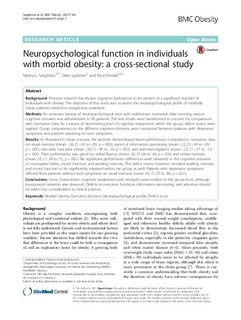Neuropsychological function in individuals with morbid obesity: A cross-sectional study
Journal article, Peer reviewed
Published version
Permanent lenke
http://hdl.handle.net/11250/2485537Utgivelsesdato
2017Metadata
Vis full innførselSamlinger
Sammendrag
Background:Previous research has shown cognitive dysfunction to be present in a significant number ofindividuals with obesity. The objective of this study was to assess the neuropsychological profile of morbidlyobese patients referred to weight-loss treatment.Methods:An extensive battery of neuropsychological tests with well-known normative data covering variouscognitive domains was administered to 96 patients. The test results were transformed to z-scores for comparisonswith normative data. As a means of determining level of cognitive impairmentwithinthe group, deficit scores wereapplied. Group comparisons on the different cognitive domains were conducted between patients with depressivesymptoms and patients reporting no such symptoms.Results:As illustrated in mean z-scores, the patients demonstrated lower performance compared to normative dataon visual memory (mean -.26, CI -.43 to -.09,p= .003), speed of information processing (mean -.22, CI -.34 to -.09,p= .001), executive functions (mean -.28, CI -.40 to -.16,p< .001), and attention/vigilance (mean -.25, CI -.37 to -.13,p< .001). Their performance was good on verbal fluency (mean .24, CI .04 to .44,p= .016) and verbal memory(mean .55, CI .38 to .72,p< .001). No significant performance differences were observed in the cognitive domainsof visuospatial ability, motor function, and working memory. The deficit scores, however, revealed working memoryand motor function to be significantly impaired within the group as well. Patients with depressive symptoms differed from patients without such symptoms on visual memory (mean .43, CI .07 to .80,p= .021).Conclusions:Some characteristic cognitive weaknesses and strengths were evident at the group level, althoughpronounced variation was observed. Deficits in executive functions, information processing, and attention shouldbe taken into consideration in clinical practice.
